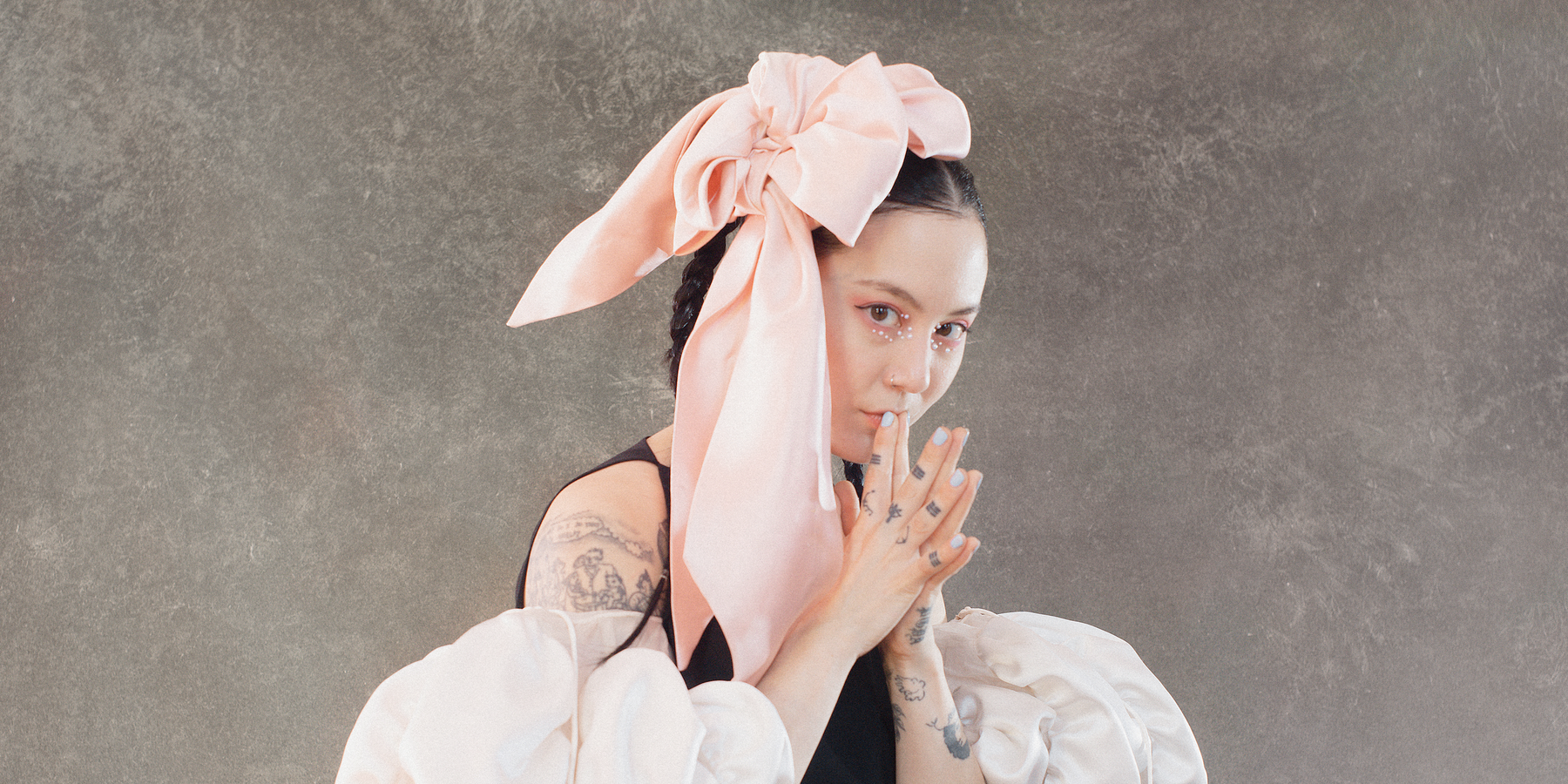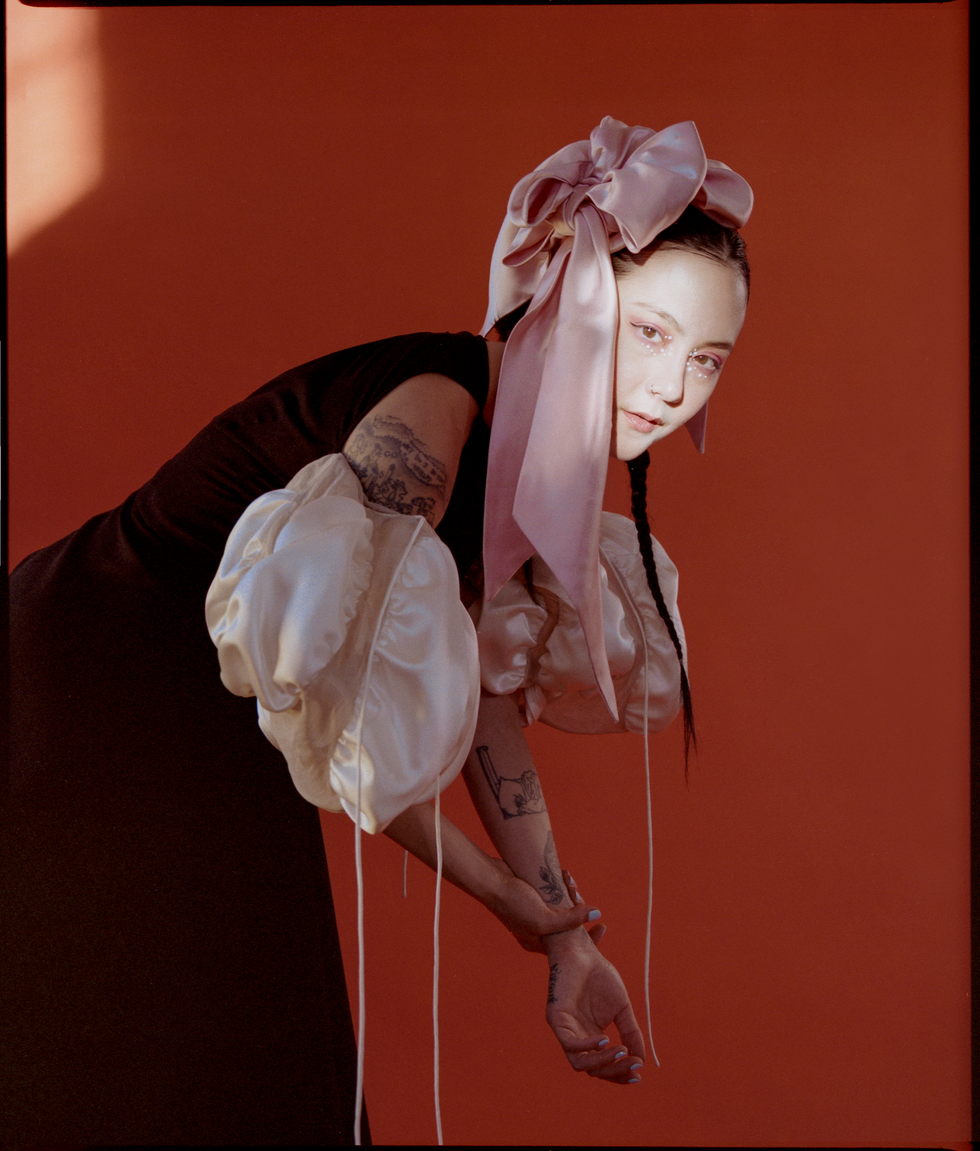
By page eight of Crying in H Mart, I’m already back at my grandma’s house in Seoul, jet-lagged and grumpy as I wait for the delivery man to arrive on his little motorized scooter. I just got off a 14-hour flight and all I want to do is eat the Korean-Chinese food my emo ordered: Fried rice, tangsuyuk and jjampong. More than anything though, I want the jjajangmyeon I’ve been thinking about since I boarded the plane in Chicago — those thick, chewy noodles covered in bits of pork and viscous black bean sauce — and it’s a craving I’m still complaining about almost a decade later to a very patient Michelle Zauner, though this Zoom interview is supposed to be about her monumental year, which includes a bestselling memoir and two Grammy nominations.
Even so, she humors me as I rant and rave about how fucking hungry I was while reading her book, nodding along as we talk about jiggae, our favorite banchan and H Mart food courts. But maybe that’s because food really is the best way to connect with other members of the Korean diaspora, much like it’s the easiest way for many of us to engage with our roots.
“It's a communal practice that we've been raised with from the time that we were born. So I think that, for me, it made sense to explore this in many different ways in the book,” Zauner, who also makes music under the moniker Japanese Breakfast, said before saying food is so intrinsically tied to family and ethnoracial identity. And in her particular situation, this was made all the more important as a mixed race person raised in the States, especially seeing as how food had “a lot to do with the validation that my mom and my Korean family gave me."
“For my mom, I think she privately worried about me becoming really Americanized,” as Zauner explained, later saying she spent a lot of time thinking about her mother’s perspective. Part of that was also wanting to sprinkle in similar anecdotes that painted her mom as a complex and nuanced individual. So rather than some “tiger mom” stereotype, Zauner tried to focus on highlighting how their relationship was complicated yet full of love, just like any other mother-daughter relationship.
“So when I ate well, it was like, ‘No, you see that? See the way that she's eating? That's my kid,’” she continued. “I think it gave her a sense of pride and belonging and, I think, subconsciously, that was something that really impacted me.”

Packed with similar insight and wisdom, it’s no surprise Crying in H Mart debuted to much fanfare and critical acclaim, landing at No. 2 on The New York Times bestseller list and lauded as a moving recollection of Zauner’s relationship with her mother, including the experience of being her caretaker, watching her cancer progress and mourning her death. However, it’s also a tender and thoughtful retelling of Zauner’s journey to embrace her heritage with the help of food during such a difficult experience, as well as the grief she felt over losing such a direct connection to her Korean side, which she said was “part of why [she] wanted to write this book.”
“I thought that it was a very unique experience, when you're mixed race and lose this tie to your culture in this way,” she said, noting that it’s “always been something that’s been, for better or worse, attached to [her],” which she remembers “resenting” at times as an adolescent.
“It wasn't until my mom died that I realized this thing that always felt like an inherent part of who I was, could become untethered in this way,” Zauner added. “And now, all of a sudden, I had to kind of actively preserve and engage with it.”
However, Crying in H Mart is also particularly special when engaged in tandem with Zauner’s music. For those who are unfamiliar with her solo musical endeavor, Japanese Breakfast was a project born from the grief surrounding her mother’s death, with the first two albums “very directly” addressing this experience through Psychopomp’s raw heartbreak or the way Soft Sounds from Another Planet sounds like a scab over a still-tender wound. Granted, her third album, Jubliee, which recently earned her two Grammy nominations for Best New Artist and Best Alternative Album, comes with a much different feel.
While there’s still a tinge of sadness underlining some of the tracks, there’s also a newfound “confidence,” as Zauner herself said, which came from feeling like Jubilee was “the first time that I felt like I could also contribute” to the sort of songwriting and composition that returning co-producer Craig Hendrix — a Berklee School of Music grad — was doing.
“I think I was just less afraid. I've always kind of hidden behind a wall of reverb, and I wanted more clarity sonically on this record. I felt more comfortable and confident in my voice and my songwriting in general,” she said.
Zauner added, “And I knew, lyrically, that the album was going to be more focused on themes of joy.”
After all, whether we’re talking about the exuberant horn arrangements featured on “Paprika” and the disco-funk bassline on “Be Sweet,” the main goal of Jubilee was to finally “explore emotions that weren't focused around grief and loss.” And though grief will, obviously, be “something that is going to live with [Zauner for her] whole life,” she explained that after two albums, six years and a book, it felt like she had “said everything [she] needed to say” creatively-speaking.

“It was time to try something new, to try and turn to different parts of life and examine them and write songs about that kind of stuff. I'm kind of giving myself permission to move forward with my life.” she said before referencing the way she tried to “dissociate” from her feelings with Soft Sound from Another Planet.
“And for Jubilee, enough time had passed where I felt like I was really able to embrace feeling again. The bad, good and in between,” Zauner continued. “I felt like I was chasing that sort of teenage capacity for intense feeling, so I feel like that was another major theme of that album.”
Speaking of feelings though, when I ask whether it’s difficult for her to think about how her mother isn’t here to see her success, Zauner takes a moment to think about her answer before saying, “It's impossible for me to not feel like my mom is looking out for me.”
“There is this suspension of disbelief that I'm interacting with. Like my mom knows,” she said before adding that it’s “hard for [her] to feel like she isn’t with me through all of this.”
“And maybe that's just something my brain has created to make it easier on myself, but I feel like it’s weirdly her doing,” Zauner says with a small smile. “It kind of just really feels like she’s my star and that she knows what I’m doing."
Photography: Tonje Thilesen
From Your Site Articles
- Japanese Breakfast — "Paprika" - PAPER ›
- Michelle Zauner Enlists Will Sharpe for Memoir Adaptation ›
- Japanese Breakfast Talks "For Melancholy Brunettes" - PAPER Magazine ›
Related Articles Around the Web
MORE ON PAPER
Fashion
Coolest Person in the Room: Vivian Wilson
Photography by Diego Villagra Motta / Styling by Angelina Cantú / Interview by Kay Poyer